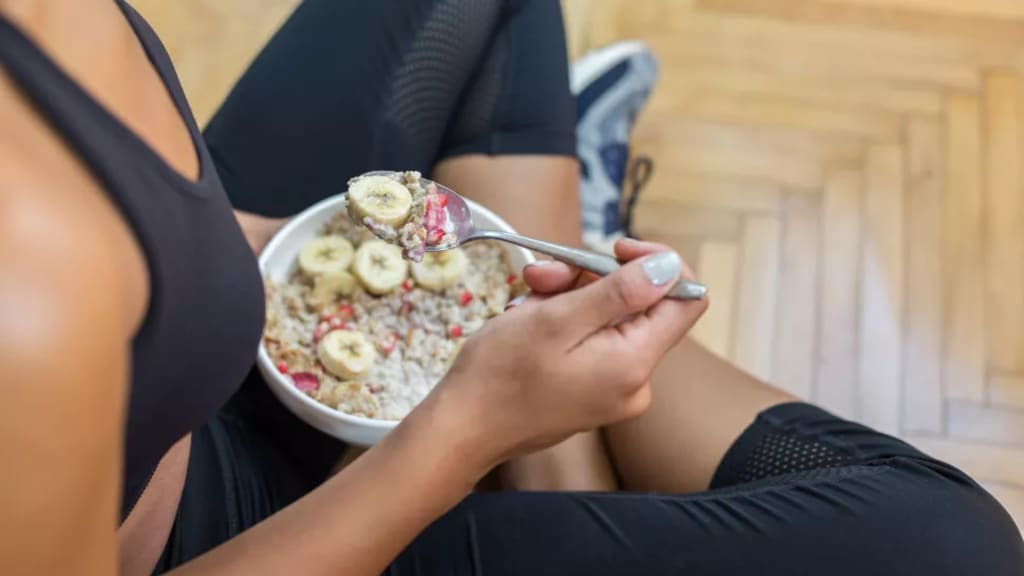How to fuel up foWhat to eat before exercisingr exercise
This is for you!

Unsure of what to eat prior to exercising? What you eat before training has a true scientific basis: normally, you should have slow-release carbohydrates for longer endurance sessions and fast-release carbohydrates for shorter, more intensive workouts.
But what exactly qualifies as a fast- or slow-release carb? How do additional macronutrients, such as protein and lipids, benefit athletes during exercise? We sought the explanation of some knowledgeable nutrition specialists.
WHAT SHOULD YOU EAT BEFORE A WORKOUT?
The type of activity you intend to do and the physiological adaption you're aiming for, such as weight loss or muscle gain, should decide your pre-training nutrition. But when it comes to supplying energy, carbohydrates win.
Before your typical workout, Rob Hobson, Head of Nutrition at Healthspan Elite, advises taking something quick-digesting, such as toast with peanut butter, an oat smoothie, or a banana (opens in new tab). Hobson advises meticulous planning of carbohydrate consumption for longer races lasting over an hour, "aiming for up to 4g of carb per kg of body weight, which implies eating numerous meals beginning four hours before you hit the start line."
WHY YOU SHOULD EAT CARBS BEFORE A WORKOUT
Your body can get its energy from three main sources: carbs (opens in new tab), proteins (opens in new tab), and lipids (opens in new tab). All are essential to keeping your body running, but carbohydrates serve as the body's primary energy source.
Although fat can serve as an energy source, it is often only used when you are fasting and haven't had any carbs. And the body only normally uses protein as fuel when it is unable to access either fat or carbohydrates. As a result, having a sufficient quantity of carbs is essential for working out because they give you the energy you want.
The physics behind it, according to Wright, is that "when we exercise, our body burns through adenosine triphosphate (ATP) at a considerably higher pace than usual. All bodily processes call for a specific amount of ATP, the body's "currency" of energy.
"Carbs that have been consumed or stored resemble long daisy chains of smaller units of carbohydrates. We have to cleave off these smaller units from the chain to transport across the body for energy when we consume carbs or when we need to utilise our stored resources, he continues. "One example of this is glucose, which is derived from carbohydrates and is transported to our cells by the blood. If it is to be utilized as fuel, it enters cellular respiration, a sequence of intricate processes that create ATP.
"Carbohydrate produces a ton of ATP during these processes, making it, at least in my perspective - and the majority of the scientific research currently available - the ideal nutrition to have leading into a workout," says the author.
According to Wright, consuming carbohydrates before to doing out can also shorten or postpone the usage of existing energy reserves, including glycogen, the form of carbohydrates that is stored in our muscles and liver.
WHEN SHOULD YOU EAT BEFORE A WORKOUT
The majority of advice suggests eating two to three hours before working out. Eight active women participated in a small study that was published in the Nutrients Journal(opens in new tab) that examined the effects of a six-hour vs a three-hour pre-feeding regimen. The three-hour group's performance outcomes were generally better, indicating that this is actually the best time to eat a lot.
It's not always easy to follow this two- to three-hour rule, though. "Having a carbohydrate-rich meal the evening before can still assist give you the energy you need if you have an early morning training session, especially if you don't fancy eating before your workout," advises Hobson.
SHOULD YOU EAT AFTER A WORKOUT?
If the idea of eating before a workout makes you queasy, foregoing a feed entirely can be advantageous. Exercise during a fasting period can encourage adaptation toward your body's capacity to use fat as a fuel source, according to Brian Carson, head of science and innovation at Whole Supp and senior lecturer in exercise physiology.
At the University of Limerick, "we have previously published a systematic review(opens in new tab) and meta-analysis examining this approach and found a greater utilization of fat during exercise, with no negative impact on performance for exercise which is performed in a fasted state and lasts less than 60 minutes," he says. We have recently released study on the benefits of eating protein and limiting carbohydrates before high-intensity sprint interval training, and we discovered that this was a great strategy for this brief intermittent type of exercise.
You can determine whether to prepare a pre-workout meal by considering other elements, according to Hobson. He notes that "some people prefer to workout on an empty stomach, and endurance athletes frequently train after fasting," which is known as "training low." "The body adjusts in favorable ways, such as enhancing the oxidation of fats (breakdown of fatty acids), which has a glycogen-sparing impact and can enhance performance when racing," according to intermittent fasting(opens in new tab) research.
What I mean is? There is no one pre-workout meal that works for everyone. Fasting offers advantages, but you might not have the energy to function if your body is in a substantial calorie deficit(opens in new tab).





Comments
There are no comments for this story
Be the first to respond and start the conversation.